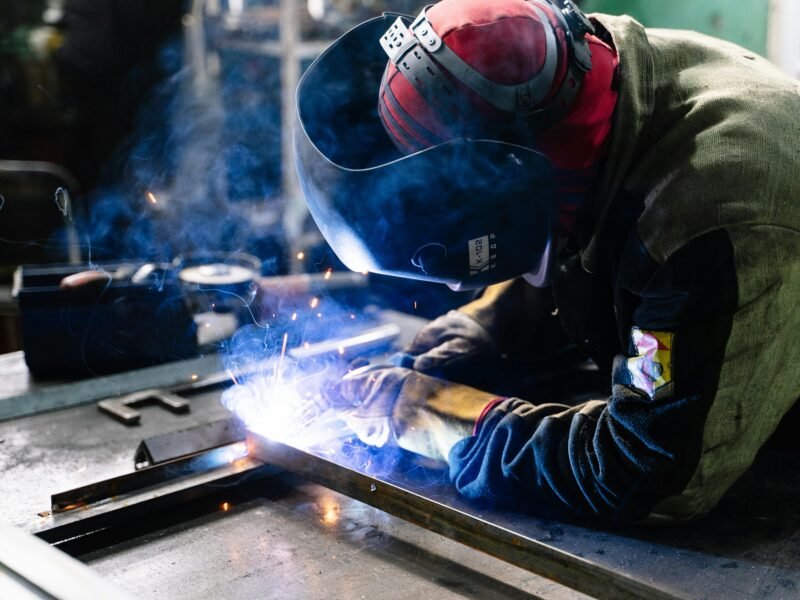Welding jobs in Canada are a critical part of its economy. With a growing demand for skilled workers, the Canadian welding industry offers plenty of opportunities for both local and international job seekers.
For foreign workers looking to build a career in welding, Canada offers visa sponsorship options, allowing skilled individuals to enter the country and contribute to the workforce.
Overview of the Welding Industry in Canada
Welding is a vital skill in Canada, playing a crucial role in industries such as construction, manufacturing, oil and gas, automotive, shipbuilding, and aerospace. Welders are responsible for joining metal components together using various techniques, including arc welding, MIG (Metal Inert Gas) welding, TIG (Tungsten Inert Gas) welding, and stick welding.
The demand for skilled welders in Canada is on the rise, driven by factors such as the expansion of infrastructure projects, the need for maintenance in industrial sectors, and the growing manufacturing and construction industries.
According to the Canadian government’s job outlook, welding is a high-demand trade with favorable employment prospects, especially in provinces like Alberta, Ontario, and British Columbia, which have booming construction and energy sectors.
Types of Welding Jobs in Canada
Welding jobs in Canada span a wide range of industries, each offering different types of roles. Some positions may require formal education or certifications, while others may provide on-the-job training. Below are some common welding jobs in Canada:
1. Structural Welder
Job Description: Structural welders work on large-scale projects, such as building bridges, skyscrapers, and other major structures. They are responsible for welding steel beams, columns, and other structural components.
Skills Required: Proficiency in MIG and TIG welding, ability to read blueprints, and knowledge of safety protocols.
Work Environment: Construction sites and factories.
2. Pipe Welder
Job Description: Pipe welders are experts in welding pipes for various applications, including water, gas, and oil pipelines. They work in industrial settings such as oil rigs, power plants, and chemical facilities.
Skills Required: Expertise in TIG and stick welding, certification in pipe welding, and knowledge of welding codes and standards.
Work Environment: Industrial facilities, oil fields, and construction sites.
3. Welding Technician
Job Description: Welding technicians are responsible for overseeing the welding process, ensuring the quality and precision of welds, and maintaining equipment. They may also inspect welded products and perform repairs.
Skills Required: Knowledge of welding techniques, quality control, and equipment maintenance.
Work Environment: Manufacturing plants, fabrication shops, and repair facilities.
4. Welder Fabricator
Job Description: Welder fabricators are skilled tradespeople who work with metal to create custom products or parts. They may work in industries such as automotive, aerospace, and manufacturing, fabricating metal components for various applications.
Skills Required: Ability to read blueprints, experience with various welding techniques, and knowledge of metalworking tools.
Work Environment: Manufacturing plants, fabrication shops, and repair shops.
5. Underwater Welder
Job Description: Underwater welders specialize in welding and repairing metal structures submerged in water. This highly specialized job often involves working on offshore oil rigs, ships, and bridges.
Skills Required: Certification in both commercial diving and welding, advanced knowledge of underwater welding techniques, and physical fitness.
Work Environment: Offshore rigs, ships, and marine structures.
Visa Sponsorship
International workers looking to secure welding jobs in Canada may be eligible for various visa sponsorship programs, depending on the type of employment they seek and the employer’s requirements.
The Canadian government offers several visa options that allow foreign workers to enter the country for employment purposes. Below are the most common visa options for welding jobs:
1. Temporary Foreign Worker Program (TFWP)
The Temporary Foreign Worker Program (TFWP) is one of the most common routes for international workers seeking employment in Canada. This program allows employers to hire foreign workers for temporary positions when they cannot find qualified Canadian citizens or permanent residents to fill the job.
- Duration: Work permits under the TFWP are typically issued for the length of the employment contract, up to a maximum of two years, with the possibility of extension.
2. International Mobility Program (IMP)
The International Mobility Program (IMP) allows foreign workers to work in Canada without the need for an LMIA. This program is designed for workers who are coming to Canada for jobs that provide significant benefits to the country, such as skilled labor positions in high-demand industries like welding.
-
Duration: Work permits under the IMP are typically issued for the duration of the employment contract, with the option for renewal.
3. Express Entry System (Federal Skilled Trades Program)
For foreign workers who want to permanently settle in Canada and have expertise in skilled trades such as welding, the Express Entry System is an excellent option. The Federal Skilled Trades Program (FSTP) is part of Canada’s Express Entry immigration system and allows skilled workers to apply for permanent residency.
-
Duration: Successful applicants receive permanent residency, allowing them to live and work in Canada indefinitely.
How to Find Welding Jobs in Canada with Visa Sponsorship
Finding welding jobs in Canada that offer visa sponsorship can be a straightforward process if you follow these steps:
1. Research Canadian Employers
Start by researching companies in Canada that offer welding jobs and are known to hire international workers. Large construction companies, manufacturing plants, and oil and gas companies are prime employers for welders.
2. Check Job Listings on Online Portals
Job websites like Indeed, Job Bank, Monster, and Glassdoor often have listings for welding jobs in Canada with visa sponsorship. Filter the search results to show positions that explicitly mention “visa sponsorship available” or “LMIA approved.”
3. Reach Out to Recruitment Agencies
Some recruitment agencies specialize in placing foreign workers in Canadian jobs, including in the welding industry. These agencies can help you navigate the visa sponsorship process and connect you with employers looking for skilled welders.
4. Network with Canadian Employers
Networking is a powerful tool for finding job opportunities. Consider reaching out to Canadian employers directly via LinkedIn or attending job fairs where you can meet potential employers and discuss available opportunities.
Benefits of Welding Jobs in Canada
Welding jobs in Canada come with numerous benefits, including:
1. Competitive Salary: Welders in Canada can earn competitive salaries, which vary depending on the type of welding job and location. Salaries typically range from $40,000 to $70,000 annually, with potential for higher earnings in specialized roles like underwater welding.
2. Job Security: The demand for skilled welders in Canada is high, and the industry continues to grow. As a result, welders can enjoy excellent job security, with opportunities to advance in their careers.
3. Healthcare and Benefits: Many Canadian employers offer comprehensive health benefits, including dental and vision care, along with retirement savings plans.
4. Opportunities for Advancement: Experienced welders in Canada can advance to higher-paying positions, such as welding supervisors, inspectors, or project managers, with additional training and certifications.
Conclusion
With the right qualifications and determination, foreign welders can take advantage of Canada’s high demand for skilled tradespeople and secure a position that offers competitive salaries, job security, and the potential for career growth.
Whether you are applying through the Temporary Foreign Worker Program, the International Mobility Program, or the Express Entry system, there are multiple pathways for skilled welders to enter the Canadian workforce and thrive in one of the most in-demand trades. Start your journey today and take the first step towards a successful career in welding in Canada!






